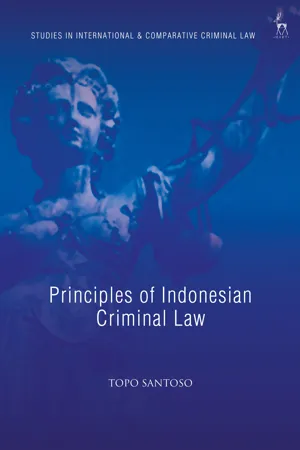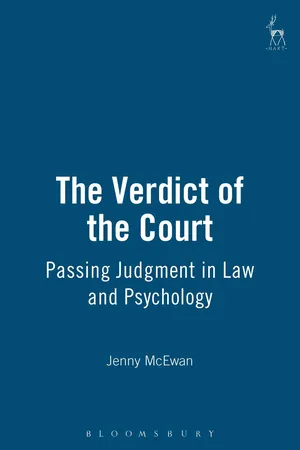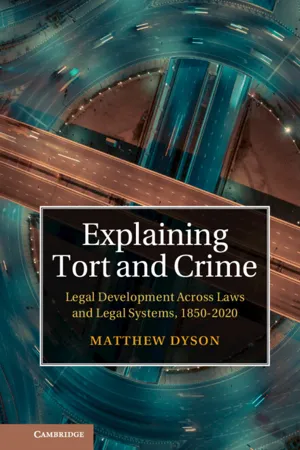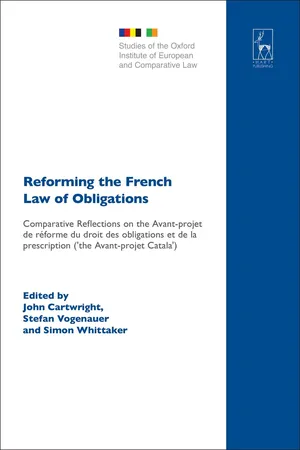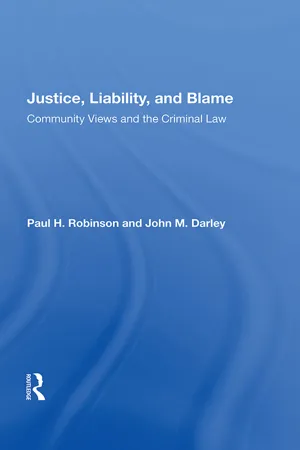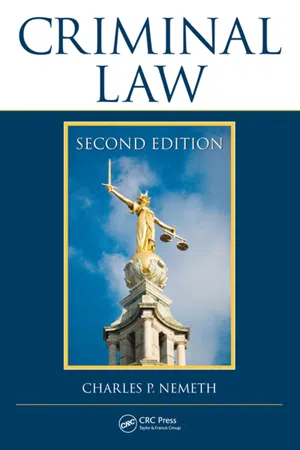Law
Fault in criminal law
In criminal law, a fault refers to the mental state or level of culpability required for a person to be held responsible for a crime. It encompasses concepts such as intention, recklessness, and negligence. The determination of fault is crucial in establishing criminal liability and sentencing.
Written by Perlego with AI-assistance
Related key terms
1 of 5
9 Key excerpts on "Fault in criminal law"
- eBook - ePub
- Topo Santoso(Author)
- 2023(Publication Date)
- Hart Publishing(Publisher)
Similarly, GA Van Hamel argues that fault in a criminal offence is a psychological understanding, which connects between the state of mind of the offender and the realisation of the elements of the crime due to his actions. A fault is thus a liability in law. Similarly, above we have discussed Karni’s opinion, which states that it is a fault if the offender can be held accountable for the action; the offender must be reproached for his action; the action must contain resistance to rights (unlawful nature); and the action must be committed either intentionally, or by mistake (negligence).What is the relationship between criminal offence and fault, in terms of criminal liability? First, we can look at the academic manuscript for the new draft Criminal Code Bill, which refers to the views of Sauer and Herbert L Packer. It is explained that there are three main issues of criminal law: (1) criminal offences (strafbaarfeit / actus reus); (2) fault (schuld / mens rea) or criminal liability; and (3) punishment (straf / poena). Sauer calls these three main issues the Trias of Criminal Law (unlawful nature, fault, and punishment) while Packer calls them the three concepts or the three basic problems (offence, guilt, and punishment).84 So, if we talk about fault then we are also talking about criminal liability – distinguishing the fault / criminal liability from a criminal offence. In the Bill, criminal offences cannot be separated from legality – they are, by definition, against the law. Meanwhile for criminal liability, the principle is that of culpability (geen straf zonder schuld - eBook - PDF
- Carlson Anyangwe(Author)
- 2015(Publication Date)
- Langaa RPCIG(Publisher)
173 Part III Criminal Responsibility 174 175 Chapter 11 The Mental Elements of an Offence: Intentional Fault Element The contemporary idea of criminal responsibility rests on the concepts of mental guilt and outward conduct. Mental guilt is founded on two ideas. The first idea is that every man has the free will and power to choose between right (good) and wrong (evil). This in itself presupposes that man has the capacity to distinguish between good and evil and has the ability to control his behaviour. The second idea concerning mental guilt is that when man opts to do wrong, he does so consciously, that is, intentionally, deliberately, or knowingly. We say he is intentionally at fault. His mind is at fault. It is guilty. Now, when he goes a step further and operationalizes, as it were, his guilty mind by actually engaging in the wrongful conduct conceived in his mind, we say he has acted unlawfully. This implies that he was capable of appreciating the wrongfulness of his conduct and that he acted in accordance with that appreciation. The conjoining of the above two separate elements of responsibility, mental fault ( mens rea ) and unlawful conduct ( actus reus ), results in a crime. Generally then, an accused person is criminally responsible only when he does an act or causes a state of affairs prohibited by the criminal law and does so with mental awareness amounting to what may be called ‘guilty mind’. This cardinal principle of the criminal law is captured by the well known maxim, ‘ actus non facit reum, nisi mens sit rea’ . The Latinism means an act does not make a person legally guilty unless his mind is legally guilty. In order to secure a conviction the prosecution must prove that the accused did the prohibited conduct with the requisite state of mind. - eBook - PDF
The Verdict of the Court
Passing Judgment in Law and Psychology
- Jenny McEwan(Author)
- 2003(Publication Date)
- Hart Publishing(Publisher)
Moral fault is normally required because the criminal law operates in general within a framework of moral blame. The clearest manifestation of moral fault is where an action not only caused harm, but also was intended to do so. The criminal law defines crimes on the basis of a simple model of human behaviour in which people perceive facts clearly, and calculate the consequences of their actions. The definitions employed: have no understanding of personality, no reference to conscious motive or uncon-scious motivation; they allow no discount to the disadvantaged; they apply without discrimination to sudden anger or unforeseen temptation as to cold revenge or cal-culated profit. 8 1 Chapter one. 2 Dominant in the law of torts: see chapter two. 3 Road Traffic Act 1988 s. 3. 4 Ibid ., s. 2. 5 Ibid ., s. 1. 6 Misuse of Drugs Act 1971 s. 28. 7 See below. 8 EJ Griew, Dishonesty and the Jury: an Inaugural Lecture (Leicester University Press, 1974) 11. Griew acknowledges that these issues have relevance at the sentencing stage. The determinist insistence on willed consequences, the ‘guilty mind’, is not the only instance of moral principle defining criminal responsibility. Even matters of causation are as much a matter of moral principle as of science. Certain defences which negate or reduce criminal responsibility also largely depend upon an assessment of moral fault. But here, as we shall see, the legal system may prefer to describe these defences in scientific terms. Scientists are routinely called as wit-nesses into court and expected there to utilise and explain concepts which began within their own discipline but have been adapted to legal ends and may have become unrecognisable. In order to achieve its purposes, the law is willing to dis-tort and manipulate scientific principles. Experts and fact-finders alike are expected to collaborate in this endeavour. - eBook - PDF
Explaining Tort and Crime
Legal Development Across Laws and Legal Systems, 1850–2020
- Matthew Dyson(Author)
- 2022(Publication Date)
- Cambridge University Press(Publisher)
Why did tort law continue to use motive in its analysis of fault concepts, but criminal law did not, restricting it to some defences and practices? Is motive just purpose in a more abstract sense than intention, or with respect to objects less tightly defined by the law? What is the distinction between indifference and motive? These issues emerge in the three chapters comprising this Part. They cover the development of Fault in criminal law (Chapter 4) and in tort law (Chapter 5) before turning to explain that development and testing it against some comparative calibrations (Chapter 6). The contents span the meaning of fault, and whether a particular form of fault is necessary for liability or merely sufficient; 3 the role of fault in shaping the structure of law and which fault elements dominated; the role of fault in justifying liability; and how the presence of fault affects how elements of liability are weighted in decision-making. 3 See, e.g., on intention, P. Cane, ‘Mens Rea in Tort Law’ (2000) 20 OJLS 533, 545. mental states and careless acts 35 3 Fault Doctrines in Criminal Law The doctrines and roles of fault in our period tell a very complex story open to different interpretations. Fault, in this context, describes what aspect of the conduct of the defendant the criminal law used to express blame. Its paradigm form in our period was intention: some sense that the defendant had a purpose in carrying out proscribed conduct or seeking to achieve a prohibited result. It had other forms. In particular, the criminal law moved from a broad-brush mens rea, focused on inten- tion, to later differentiating between four forms: intention, deliberate risk-taking, negligence and permitting strict liability. The perspective adopted here begins with fault, doctrinally expressed as mens rea. Mens rea was subject to greater focus in the eighteenth century, when it was more openly stated as being necessary for liability. - eBook - PDF
- Thomas Gardner, Terry Anderson(Authors)
- 2017(Publication Date)
- Cengage Learning EMEA(Publisher)
All the state needed to prove, the court said, was that the sexual acts occurred. The woman’s contention that she was asleep was an affirmative defense, the court said, and she carried the burden of proof on that defense. Mens Rea: The Guilty Mind A cardinal principle of criminal law pertaining to true crimes was long ago ex- pressed in Latin as actus non facit reum nisi mens sit rea (“an act does not make a person guilty unless the mind is guilty”). The term mens rea means evil intent, criminal purpose, and knowledge of the wrongfulness of conduct. It is also used to indicate the mental state required by the crime charged, whether that is specific intent to commit the crime, recklessness, guilty knowledge, malice, or criminal negligence. Criminal liability usually requires “an evil-meaning mind [and] an evil-doing hand.” 3 However, while the phrase evil-meaning mind suggests an evil purpose for doing the evil act, a mind can be “guilty” without such evil purpose. For example, doing an act recklessly, but without the “evil” intent to harm another, may lack the mens rea for one crime but nonetheless satisfy the mens rea requirement of another. One’s state of mind can range from being “purposeful”—that is, intending a par- ticular result or consequence—to merely negligent—that is, failing to be aware of the probable results or consequences of an act. Figure 3.1 illustrates the degrees of mental fault. WHEN F AILURE TO ACT IS A CRI F F M E State and federal criminal codes usually identify and prohibit specific, affirmative actions, called crimes of commission. Examples of these crimes are the prohibitions against murder, robbery, and similar crimes where the crime consists of taking defined actions. A small percentage of crimes in criminal codes are crimes of omission—failure to act when a duty or obligation is imposed upon persons under certain circumstances. The following are examples of crimes of omission that can be found in state criminal codes. - eBook - PDF
Reforming the French Law of Obligations
Comparative Reflections on the Avant-projet de réforme du droit des obligations et de la prescription ('the Avant-projet Catala')
- John Cartwright, Stefan Vogenauer, Simon Whittaker, John Cartwright, Stefan Vogenauer, Simon Whittaker(Authors)
- 2009(Publication Date)
- Hart Publishing(Publisher)
12 The Definition of la faute in the Avant-projet de réforme JEAN-SÉBASTIEN BORGHETTI F AULT IS ONE of those concepts that jurists find particularly diffi-cult to define because they are not exclusively legal notions: legal or juridical fault is just one type of fault among many others and co-exists with moral fault, political fault, fault in a sporting context, etc. All these particular types of fault are often seen as various instances of a single overarching category. It is true that the basis for such an essentialist posi-tion which would postulate the existence of an absolute concept of fault without any qualification or modification is debatable. Nevertheless, it is clear that the word ‘fault’ forms a part of everyday language and that, as such, it has a significance which is not primarily juridical. Fault is certainly not the only term borrowed from everyday language which is employed to designate a legal concept. The law of civil liability is indeed very rich—though no more so than the other branches of the law— in these ambiguous concepts which first have significance for the generality of human beings before they identify a particular legal concept: harm, causation or indeed defectiveness are further examples, along with fault. It is inevitable as well as desirable that the law should borrow from everyday language some, indeed the majority, of the terms that it uses. That expresses the link between law and the reality for which it is called to provide structure, reinforcement and direction—a link which should be unbreakable. These concepts, which are in a certain sense at the crossroads between everyday language and legal language, nevertheless create particular diffi-culties in terms of their definition. Their legal meaning must be clearly distinguished from their ordinary meaning. - eBook - ePub
Justice, Liability, and Blame
Community Views and the Criminal Law
- Paul H. Robinson(Author)
- 2019(Publication Date)
- Routledge(Publisher)
Doctrines of Culpability: When Is One’s Violation of a Legal Rule Blameworthy?Once we have determined what we want our legal code of conduct to be (the subject of Chapters 2 and 3 ), we need to answer the question of when liability should or should not follow a code violation. Even if a person violates one of the criminal law’s rules, it does not follow that liability is appropriate. The condemnatory nature of criminal law requires that inadvertent and unavoidable violations not be punished. If a person’s violation is blameless, that individual ought to be free from liability even though he or she may well have caused the harm or evil prohibited by the doctrines of criminalization. Furthermore, liability is properly reserved for violations of sufficient seriousness committed with sufficient culpability to justify condemnation as criminal. Chapters 4 and 5 examine the criminal law’s and the community’s views on this issue of the minimum requirements for liability.The law tests for adequate blameworthiness in two ways. First, it requires proof that the person’s violation did not occur by virtue of blameless accident or mistake. This is achieved by requiring the prosecution to prove a person’s culpability-purpose, knowledge, or recklessness (or occasionally negligence)-as to each element of an offense. As a second test, the law provides the person with the opportunity to raise various defenses-such as insanity, immaturity, duress, or involuntary intoxication-that suggest that, even if a person had the required culpable state of mind, the individual nonetheless is not responsible for his or her violative actions. In this chapter, we discuss the studies we conducted that concern the first kind of minimum requirement, the culpable state of mind. In Chapter 5 - eBook - PDF
- Charles P. Nemeth(Author)
- 2011(Publication Date)
- Routledge(Publisher)
Willful blindness: Deliberate failure to make a reasonable inquiry of wrongdoing despite suspi-cion or an awareness of the high probability of its existence. IDEA AND MENTAL STATE IN CRIMINAL CULPABILITY Crimes, for the most part, require two major components: an act, known as actus reus, and a mind, known as mens rea. And these two components need an integration of sorts. In other words, simply acting without thinking or intending a particular result or end may not be enough for criminal culpability. Conversely, thinking without acting is rarely, if ever, a crime. Mental Actus Reus and Mens Rea 84 thoughts, the content and substance of what is going on in the intellect, will not suffice for a criminal prosecution. So, in a sense, these two components are bound together in order for criminal responsibility to attach. The actor must think of the act and intend its outcome. This central conclusion constitutes the chapter’s coverage—discerning how culpability depends on both doing and willing a particular result. Acts alone do not suffice. The sum and substance of criminal culpability assumes not only the act, but also the corresponding mindset, which mani-fests intentionality. In Western jurisprudence, more than movement is required. An acts plus the required mental state triggers culpability: ACTUS REUS + MENS REA = CULPABILITY Side by side with the act ride the mental faculties of those accused of wrongdoing. One’s act, coupled with a particular mindset, inevitably leads to criminal responsibility. Acts are prompted and nourished by intention. Acts, without thought, cannot prompt the type of punitive consequences envisioned in criminal codification. Even so, just as thought alone provides an insufficient basis, a criminal charge will not be sustained without activity of some sort. Proving each element is never an easy undertaking for the justice professional. The greater challenge lies in the world of mind, that mental state that demonstrates the inten-tionality. - eBook - ePub
What About Law?
Studying Law at University
- Catherine Barnard, Janet O'Sullivan, G J Virgo, Graham Virgo(Authors)
- 2021(Publication Date)
- Hart Publishing(Publisher)
mens rea, but many do, especially serious crimes, because it is the fact that the defendant was at fault which makes them particularly blameworthy and justifies the state in punishing them. Relevant fault elements include intention, recklessness and negligence. For the crime of murder the relevant fault element is that the defendant intended either to kill or to cause serious injury. If this cannot be established, the defendant cannot be convicted of murder, although they might still be guilty of a less serious offence, such as manslaughter. Once the external and fault elements have been established, the third element is whether the defendant has any defences to the crime. For the crime of murder there are a number of full or partial defences which might be available. For example, if the defendant was attacked by the victim, the defendant could plead self-defence. If this defence is successful the defendant would be acquitted of the crime completely, so this is a full defence. Alternatively, the defendant might plead defences such as loss of self-control or diminished responsibility. If one of these partial defences is successful the defendant would be convicted of the less serious offence of manslaughter rather than murder.THE REASONS FOR PUNISHMENTAssuming that the defendant has been convicted of a crime, they can expect to be punished. The criminal law recognises a variety of forms of punishment including imprisonment, fines and community orders. Different reasons for punishment can be identified depending on the nature of the punishment, but there are four main reasons why the state wishes to punish a defendant who has been convicted of an offence. First, there is the need to protect the public from dangerous criminals, which can be satisfied by locking the defendant up in prison for a significant period of time. Secondly, there is the need to deter the defendant and other potential defendants from committing crimes. Thirdly, there is the need to rehabilitate defendants to seek to ensure that they do not commit crimes in future. Finally, there is the need for retribution: society wishes to mark certain types of conduct as wrongful and reassert the accepted social order by punishing the wrongdoer.
Index pages curate the most relevant extracts from our library of academic textbooks. They’ve been created using an in-house natural language model (NLM), each adding context and meaning to key research topics.
